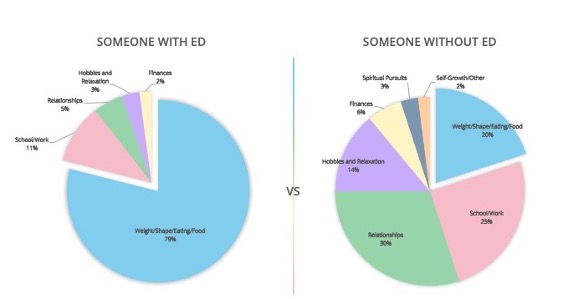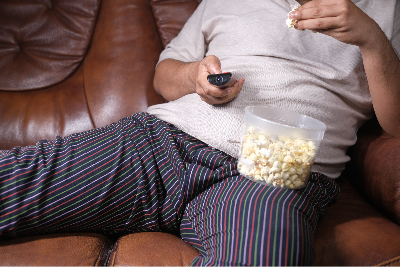
Tips & Tools
Managing your anxiety
The Links Between Anxiety and Eating Disorders

Eating disorders (EDs) are complex mental illnesses that also show themselves through the body (NEDIC.ca). While many complex factors intersect in the emergence of an eating disorder, and eating disorders are serious and can have life-threatening complications, they are also very treatable. This is excellent news in a world where eating disorder rates have increased significantly over the last few years!
How do I identify if I have an eating disorder and if anxiety exacerbates it?
Eating disorders affect people of all shapes, sizes, genders, races, and lifestyles – so this is a GREAT question! There are three main components we start with when trying to determine if someone may be struggling with an eating disorder. They are:
- Over-Focus on Body Shape, Size and/or Weight - we all care about how we look to some degree. However, for someone with an eating disorder, it can start to feel like weight, shape and/or size are the most important things. It would begin to feel like every day someone is waking up and thinking about their weight, checking their body through the day, and then going back to bed thinking about weight and their day’s eating. Weight starts to become the centre of their world, as you can see from the charts below.
 |
- A Lot of Time and Energy Goes into Trying to Control Weight/Shape/Size – this may be through eating (portions, types of foods, number of meals, etc.) or other things like exercise, or getting into dangerous habits like making one’s self vomit or mis-using some pharmaceuticals. The irony is that a lot of these strategies don’t even work! But that only tends to make people try even harder. So if trying to control weight, shape, or size takes up a considerable chunk of the day, that is a concern.
- One’s Ability to Function Starts to Be Affected – this can be biological (i.e., dizziness, nausea, upset stomach, hair falling out, etc.) OR it can be psychological (i.e., trouble concentrating, difficulty shifting attention, worsening memory, etc.), emotional (i.e., irritability, lower mood, more anxiety, etc.) or social (i.e., avoids time with friends, drops out of regular activities, less time for things because of the ED behaviours).
 If one is suffering to a reasonable degree in at least two of these areas, we definitely assess further for eating disorder. BUT if one doesn’t suffer in all areas, and the last one (food/eating/weight impairing functioning) is still relevant, it still counts! There are eating issues not specifically linked to weight/shape that are more about food phobias, vomiting/choking/allergy phobias or extend from trauma that can significantly affect eating and impair life. These EDs are less common but not fun and worthy of treatment!
If one is suffering to a reasonable degree in at least two of these areas, we definitely assess further for eating disorder. BUT if one doesn’t suffer in all areas, and the last one (food/eating/weight impairing functioning) is still relevant, it still counts! There are eating issues not specifically linked to weight/shape that are more about food phobias, vomiting/choking/allergy phobias or extend from trauma that can significantly affect eating and impair life. These EDs are less common but not fun and worthy of treatment!
As for whether anxiety can exacerbate it – 100%! See more below.
Are eating disorders and anxiety commonly seen together?
Absolutely. I’d even say almost every time. ED’s cause more anxiety and anxiety tends to trigger the ED.
In some ways, an ED can be considered a coping tool. One usually doesn’t feel great before it starts – and that usually involves quite a bit of anxiety. They might be worried they don’t fit in, feel socially anxious, were bullied, were just anxious, or perfectionistic types trying to be their best at everything. All of that involves anxiety, and the ED tends to feel like a way to manage these things. In essence, the lie an ED tells a person is, “if you could just have the ‘right’ weight, everything would be amazing, and you wouldn’t have to worry anymore.” It’s not true, but a person who’s been struggling with anxiety may feel so desperate for a way out it can feel really enticing!
And some non-weight-focused eating disorders, like Avoidant Restrictive Food Intake Disorder (ARFID), are basically ALL about anxiety. They are more linked to food fears, phobias and/or anxiety related to trauma.
AND anxiety can accidentally trigger EDs. For many people, anxiety causes nausea and/or stomach upset. So many people who are anxious have trouble eating. Not because they WANT to lose weight – it’s just too hard to eat with anxiety for some people. But, in these cases, they usually want to regain the weight. However, sometimes the thin privilege that sometimes results gets hard to let go of, AND the effects of starvation can be so strong that an ED develops.
So, most of the time, treatment involves working on anxiety too. This helps to make it easier to eat. It also gives people more effective tools for managing anxiety, so they don’t feel reliant on the ED for help.
How can I support myself with an eating disorder when going to post-secondary school?
Honestly, the best way is by eating regularly! Eating every 2.5-3 hours, a portion that honours your hunger and respects your fullness. And limit any urges to try and “get rid of the food” (i.e., exercise, restriction, vomiting, etc.) after.
If that’s hard, that’s common as EDs are challenging to deal with. So your best bet is to contact the National Eating Disorder Information Centre (NEDIC.ca) for resources, information, and/or to be linked to a helping professional. Talk to your doctor. Seek an ED-trained dietician (you can find some on the NEDIC website) and/or talk to an ED-trained therapist!
Written by: Joelle Anderson
 Joelle Anderson, MA, RP, CCC (she/her)
Joelle Anderson, MA, RP, CCC (she/her)
Psychotherapist, Counsellor & Consultant
Website: kernelofwisdom.com
Email: [email protected]
Office: 905-852-3450
Cell: 647-880-7118
- All
-
29 Nutrition
Nutrition
- 73 Mindfulness and Relaxation
- 27 Student Life
- 8 Exercise
- 51 Treatments & Therapies
- Anxiety Resources

Don't see what you're looking for? Send us an email!
©Copyright 2024 Cam’s Kids powered by Kids Help Phone
Not-for-Profit Organization. B/N: 921508-5
Thanks for visiting Cam's Kids. Please remember...
Cam's Kids is not a service provider.
If you are in crisis, please call 911 or go to your nearest emergency department. For free, confidential counselling, contact Good2Talk or Kids Help Phone.
Post-secondary students: find your local crisis resource here.

